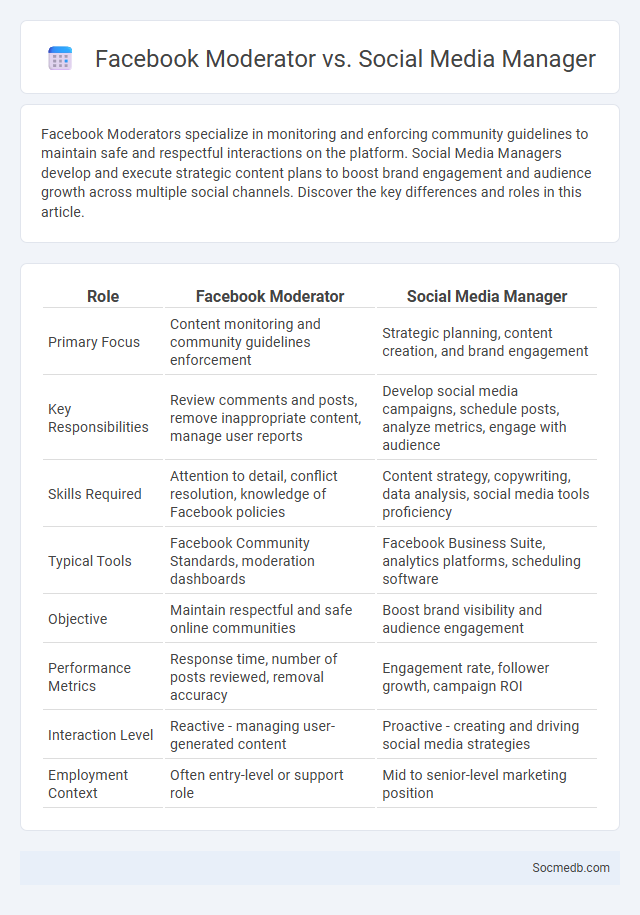
Photo illustration: Facebook Moderator vs Social Media Manager
Facebook Moderators specialize in monitoring and enforcing community guidelines to maintain safe and respectful interactions on the platform. Social Media Managers develop and execute strategic content plans to boost brand engagement and audience growth across multiple social channels. Discover the key differences and roles in this article.
Table of Comparison
| Role | Facebook Moderator | Social Media Manager |
|---|---|---|
| Primary Focus | Content monitoring and community guidelines enforcement | Strategic planning, content creation, and brand engagement |
| Key Responsibilities | Review comments and posts, remove inappropriate content, manage user reports | Develop social media campaigns, schedule posts, analyze metrics, engage with audience |
| Skills Required | Attention to detail, conflict resolution, knowledge of Facebook policies | Content strategy, copywriting, data analysis, social media tools proficiency |
| Typical Tools | Facebook Community Standards, moderation dashboards | Facebook Business Suite, analytics platforms, scheduling software |
| Objective | Maintain respectful and safe online communities | Boost brand visibility and audience engagement |
| Performance Metrics | Response time, number of posts reviewed, removal accuracy | Engagement rate, follower growth, campaign ROI |
| Interaction Level | Reactive - managing user-generated content | Proactive - creating and driving social media strategies |
| Employment Context | Often entry-level or support role | Mid to senior-level marketing position |
Understanding the Roles: Facebook Moderator, Social Media Manager, and Moderator
Facebook Moderators focus on monitoring content to ensure it complies with community guidelines and remove inappropriate posts or comments promptly. Social Media Managers develop and implement strategies to grow your brand's online presence, create engaging content, and analyze performance metrics across multiple platforms. Moderators facilitate discussions within online communities by enforcing rules, encouraging positive interactions, and resolving conflicts to maintain a respectful environment.
Key Responsibilities of a Facebook Moderator
A Facebook moderator monitors user interactions and content to enforce community guidelines and maintain a safe environment for Your audience. They review and remove harmful posts, spam, and offensive comments while responding to user inquiries and escalating serious issues to appropriate teams. Data analysis of engagement patterns helps their proactive approach in fostering positive community growth and mitigating risks.
What Does a Social Media Manager Do?
A social media manager develops and implements content strategies to increase brand awareness and engagement across platforms like Facebook, Instagram, Twitter, and LinkedIn. They analyze audience insights, track performance metrics such as reach, impressions, and conversions, and adjust campaigns to optimize results. Managing community interactions, scheduling posts, and coordinating with marketing teams are essential tasks to ensure cohesive online presence and brand consistency.
General Moderator: Scope and Duties
General Moderators play a crucial role in maintaining the quality and safety of social media platforms by monitoring user-generated content and ensuring adherence to community guidelines. Their duties include reviewing posts, managing disputes, removing harmful or inappropriate material, and fostering respectful interactions among users. By efficiently overseeing online discussions, General Moderators help protect Your social media experience from spam, abuse, and misinformation.
Skills Required for Each Role
Effective social media management requires a blend of skills tailored to specific roles. Content creators must excel in copywriting, graphic design, and video editing to craft engaging posts. Social media analysts need proficiency in data interpretation, analytics tools, and audience behavior to drive strategic decisions that enhance Your brand's online performance.
Tools and Platforms Used by Each Position
Social media managers utilize platforms like Hootsuite and Buffer to schedule posts and analyze engagement metrics across channels such as Facebook, Instagram, and Twitter. Content creators rely on Canva and Adobe Creative Cloud to design visually appealing graphics and videos tailored for platforms including TikTok and LinkedIn. Community managers engage with audiences using tools like Sprout Social and Brandwatch to monitor conversations, respond to comments, and manage brand reputation in real-time.
Differences in Daily Tasks and Workflows
Social media managers handle content creation, scheduling, and audience engagement daily, while analysts focus more on data monitoring, trend analysis, and reporting metrics to optimize campaigns. Your team's workflows differ as content creators prioritize creativity and timing, whereas strategists emphasize data-driven decision-making and performance tracking. Understanding these distinct roles ensures efficient collaboration and maximizes overall social media impact.
Impact on Community Engagement and Brand Reputation
Social media platforms significantly enhance community engagement by enabling real-time interaction and fostering a sense of belonging among users. Your brand reputation benefits from active social media management, which builds trust and credibility through transparent communication and responsive customer service. Leveraging insights from social media analytics helps tailor content strategies to meet audience needs and strengthen community loyalty.
Career Pathways: Opportunities and Growth
Social media platforms offer diverse career pathways including digital marketing, content creation, influencer management, and data analytics, driving significant opportunities for professional growth. Skills in SEO, social media strategy, and audience engagement are highly sought after, enabling individuals to advance rapidly within industries like advertising, media, and e-commerce. Continuous learning and adaptation to emerging trends such as AI-driven marketing tools or video content platforms further enhance career development prospects in the social media landscape.
Choosing the Right Role for Your Business or Career
Selecting the appropriate social media role for your business or career involves analyzing target audience demographics and platform engagement metrics to maximize visibility and interaction. Leveraging roles such as content creator, community manager, or social media strategist ensures tailored communication strategies aligned with brand objectives. Understanding platform-specific algorithms and user behavior enhances role effectiveness, driving growth and competitive advantage.
 socmedb.com
socmedb.com